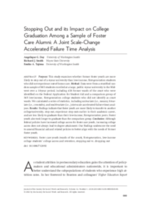ABSTRACT
Purpose: This study examines whether former foster youth are more likely to stop out of a 4-year university than low-income, first-generation students who did not experience out-of-home care. Method: Data were from a stratified random sample of 803 students enrolled at a large, public 4-year university in the Midwest over a 10-year period, including 438 former wards of the court who were identified on the Federal Application for Student Aid and a comparison group of 365 low-income, first-generation college students who did not identify as court wards. We calculated a series of statistics, including univariate (i.e., means), bivariate (i.e., crosstabs), and multivariate (i.e., joint-scale accelerated failure time) analyses. Results: Findings indicate that foster youth are more likely to transfer to another college/university, stop out, experience stop outs earlier in their academic career, and are less likely to graduate than their low-income, first-generation peers. Foster youth also took longer to graduate than the comparison group. Conclusion: Although federal policies have increased college access for foster care youth, increasing college access does not always lead to degree attainment. Our findings underscore the need to amend financial aid and related policies to better align with the needs of former foster youth.

